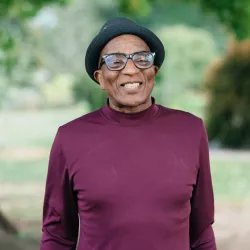Ronnie Pepper
2023 National Association of Black Storytellers: Black Appalachian Storytellers Fellowship

Recipient Information
Location
Henderson County, North Carolina
Year of Award
2023
Grant or Fellowship
Black Appalachian Storytellers Fellowships
Grant Amount
$5,000
Ronnie W. Pepper is a passionate Black Appalachian Storyteller whose roots run deep in the heart of Hendersonville, North Carolina. His journey as a storyteller has spanned over five decades, and throughout his remarkable career, he has dedicated himself to preserving the unique stories of his community.
A Legacy of Storytelling
Since 1970, Ronnie has been captivating audiences with his storytelling prowess. His storytelling journey began with his upbringing in Hendersonville, where he learned the art of storytelling from his elders. Ronnie's mother's regular house visits to aid older community members provided him with the opportunity to hear the rich narratives of his community. It was during these visits that he honed his ability to truly listen and encourage storytellers to delve deeper into their tales. Ronnie's inquisitive nature was nurtured at church by Rev. Marsh and his Sunday School teachers, who took the time to mentor him.
As an adult, Ronnie further refined his storytelling skills through his involvement with the Hendersonville Community Theater and as a dedicated Head Start teacher. His commitment to storytelling was underscored by his participation in the Black Storytellers program at the Barter Theater in Virginia. Currently, Ronnie chairs the local Black History Research Group, is closely affiliated with the Story Telling Education and Arts Program (STEAP), and actively engages with his community through his role at the local library. He also serves on the boards of the local Housing Authority and NAACP chapter and collaborates with organizations like the Center for Cultural Preservation and the local Community Foundation.
Connecting Through Stories
Ronnie's storytelling transcends age and background barriers. He is invited to speak at an array of venues, including theaters, colleges, historical associations, Head Start programs, churches, schools, civic groups, book clubs, camps, retirement homes, and libraries. Ronnie's approach involves providing brief introductions to contextualize each story, allowing his audience to appreciate the cultural and historical significance. Drawing from his background in early childhood education, Ronnie carefully selects and adapts his stories to engage listeners of all ages, including those with special needs.
Incorporating singing into his programs, Ronnie has found a special resonance with both his youngest and oldest audiences. He has also ventured into using historic photos to enhance the visual storytelling experience. Most of Ronnie's stories revolve around the lives of people in his community, including his own experiences growing up in a small North Carolina town before desegregation. He also enjoys weaving in folk tales, particularly those from Africa, always choosing stories with moral lessons that listeners can carry with them.
Mentoring the Next Generation
Ronnie is dedicated to mentoring the next generation of storytellers. He initiated a mentoring program for at-risk 13-year-olds of color at a local middle school, incorporating storytelling as a crucial component. Ronnie also encourages elders in his community to share their stories by conducting video interviews for the local Black History website. He extends his mentoring efforts through STEAP, championing the mission of identifying and nurturing diverse, overlooked artists.
Passing on the Tradition
For Ronnie, storytelling is not just an art form; it's a tradition that must be passed on from one generation to the next. He urges his audiences to listen not only with their ears and eyes but also with their hearts and intuition, emphasizing that the essence of storytelling lies in sharing from the heart. Ronnie's fervent hope is that his example as a storyteller will inspire others, both young and old, to embark on their storytelling journeys in formal and informal settings. He remains committed to telling stories to preschoolers, kindergartners, elementary and middle school students, guiding them, encouraging them, and listening to their stories to keep the tradition alive.
"James Baldwin"
One of Ronnie's most beloved stories revolves around the Kingdom of Happy Land, a community of freed African Americans who sought a better life in Henderson County after Emancipation. These resilient individuals toiled in local mines, built railroads, worked at inns, sold eggs, and crafted herbal remedies. Their unwavering determination led them to purchase 160 acres of land, establishing a self-governing community with its own King and Queen—a testament to the enduring spirit of Black Appalachians.
BASF Project: Kingdom of Happy Land
Ronnie Pepper is embarking on a project centered around the Kingdom of Happy Land, a historical African American community. A prize-winning African American author is currently working on a novel inspired by Happy Land, set to be released next year. Ronnie aims to complement this novel by creating a multimedia program that tells the story of Happy Land from the perspective of one of its residents. To enhance the impact of this monologue, Ronnie plans to incorporate newly discovered details about the community's residents from various historical sources such as wills, church records, census records, and newspaper articles. The grant money will be used to improve the monologue by integrating historic photos, music, sound effects, and props. This project not only aims to shed light on the local mythology of Happy Land but also emphasizes the importance of reevaluating history from a Black perspective, especially in the context of ongoing discussions about how Black history should be taught in schools.
Ronnie's goal is to have a preliminary program ready by January to debut at the community Martin Luther King Breakfast, a significant event that draws a diverse crowd. Subsequently, the program will be presented at Vision Hendersonville, a training initiative for young community leaders. Ronnie is also forging connections with local teachers to explore opportunities for introducing Happy Land's history into various subjects like social studies, math, and science. Ultimately, the project's vision extends beyond Western North Carolina, aiming to create an engaging and thought-provoking program that will resonate with a diverse national audience, making the story of Happy Land more widely known and appreciated.